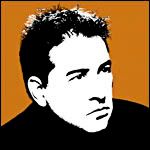Thinking About San Francisco
The same day, I also thought about San Francisco where people live more freely than anywhere. Somehow, an all-emcompassing "rule" established itself in San Francisco wherein it is allowed, accepted and even expected that people will be allowed to do (nearly) whatever they want. And when they do, a law will be established, either written or unwritten, to allow them to do so.
In other parts of the world, if someone did the free things people do in San Francisco, the reaction would be, "What?! Do you think that you can do whatever you want?" San Francisco is the great experiment, the great social laboratory for testing far-out ideas. In San Francisco, people live out these ideas as lifestyles. It's as if San Francisco is the test tube into which the rest of the world throws its ingredients for wild ideas and then awaits the results. Afterward, in places outside San Francisco, those ingredients are added to the local social mix in less amounts so the same social effect can be achieved, but to a more acceptable (that is, not radical) degree.
= = = = = = = = = = = = = = = = = = = = = = = =
There is something to be said for social regulation by law and by peers: it keeps people in agreement on mores and values, keeping the peace and allowing everyone to get on with other matters.
Durkheim warned of such unchecked freedoms as are allowed in San Francisco. Boundless freedoms create unwieldly, unacheivable expectations in people. Unrestricted freedoms (of thought, too) allows peoples' wants to grow beyond possibility, creating a vehicle for failure, disappointment and depression. And anger, I would add: where freedoms are most greatly allowed, most greatly expected, then even the smallest infractions appear as great felonies. Also, where a premise of freedom is established but never clearly stated (the unwritten "rule of freedom" remains an unconscious understanding), then perceived restrictions to this freedom are confronted by peoples' likewise non-specific (unconscious) anger. Non-specified anger toward non-specified targets for transgressions of an un-written (but unconsciously assumed) right. This works like monster movies of the 1950s: their creation, as a genre, was to give a face to the non-specific feelings of myriad changes in the world post WWII which collectively must have felt like some great interference with the old known world order. Monsters were the face given to these feelings of change to what used to be a familiar world.
Durkheim warned of such unchecked freedoms as are allowed in San Francisco. Boundless freedoms create unwieldly, unacheivable expectations in people. Unrestricted freedoms (of thought, too) allows peoples' wants to grow beyond possibility, creating a vehicle for failure, disappointment and depression. And anger, I would add: where freedoms are most greatly allowed, most greatly expected, then even the smallest infractions appear as great felonies. Also, where a premise of freedom is established but never clearly stated (the unwritten "rule of freedom" remains an unconscious understanding), then perceived restrictions to this freedom are confronted by peoples' likewise non-specific (unconscious) anger. Non-specified anger toward non-specified targets for transgressions of an un-written (but unconsciously assumed) right. This works like monster movies of the 1950s: their creation, as a genre, was to give a face to the non-specific feelings of myriad changes in the world post WWII which collectively must have felt like some great interference with the old known world order. Monsters were the face given to these feelings of change to what used to be a familiar world.
= = = = = = = = = = = = = = = = = = = = = = = =

No comments:
Post a Comment